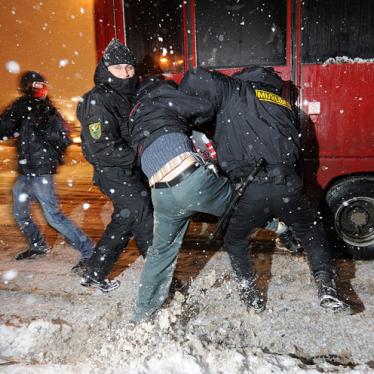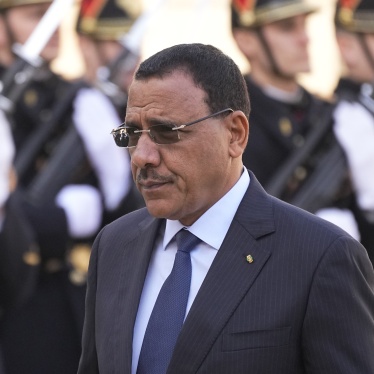(Moscow) - Belarusian authorities should respect the right to freedom of assembly and stop arresting peaceful protesters, Human Rights Watch said today.
On July 3, 2011, Belarusian police arrested about 340 people who participated in silent protests in the capital, Minsk, and several other Belarusian cities. Witnesses told Human Rights Watch that in Minsk riot police beat peaceful protesters and used teargas to disperse them. As of July 5, courts in at least 41 cases had issued fines or sentenced the people arrested to up to 15 days of administrative detention for "hooliganism." The rest have apparently been charged and are on trial or awaiting trial. The authorities should immediately release all those held for engaging in their right to peaceful assembly, Human Rights Watch said.
"The police crackdown in Belarus is brutal, absurd, and wrong," said Hugh Williamson, Europe and Central Asia director at Human Rights Watch. "Arresting people for walking silently or clapping their hands is an outrageous assault on peaceful assembly."
The Belarusian government renewed its crackdown on civil society and independent media following the December 2010 presidential elections. In the past few months, the political opposition has been using social networking media to organize "silent protests" every Wednesday. Hundreds and sometimes thousands of demonstrators gather on the streets and squares of Belarusian cities and towns to protest peacefully the increasingly repressive government of President Aleksandr Lukashenka. Protesters walk around clapping their hands or stand silently.
Two witnesses to the July 3 protest on Minsk's Privokzalnaya Square, which drew several hundred demonstrators, told Human Rights Watch that police in civilian clothes forcibly hauled the silent protesters into waiting police vans. Police sprayed teargas when protesters started clapping.
A local television journalist who was detained while filming the protest told Human Rights Watch that police hit and punched him as they tried to seize his camera. Even though he told police he was a journalist and showed them his badge, police took away his camera and forced him into a police van.
"Inside the van, police officers in uniforms forced me to lie on the floor with five other men and started kicking and beating us, while we were on the floor," the journalist told Human Rights Watch. "There were 15 other people in the van apart from me, men and women. One woman was pregnant."
The journalist and other detainees were held in a van for about 40 minutes and then taken to the Oktyabrskaya police station in Minsk, where the journalist was held for a further 40 minutes and then released without explanation. Police returned his camera, which he said police had broken beyond repair.
A woman who witnessed the protest told Human Rights Watch that security forces started arresting people before the protest began.
"People were just standing there and before they knew it, the police officers started picking some of them up by their arms and legs and throwing them into buses," she said. "I saw law enforcement officials spraying teargas into cameras of journalists who attempted to film the events. One man near me, who had teargas sprayed right into his face, screamed and a security officer responded: ‘Calm down, it's just pepper spray.'"
A Belarusian human rights lawyer told Human Rights Watch that the previous two silent protests, on June 22 and June 29, were also violently dispersed by riot police, who arrested many participants on trumped-up misdemeanor charges of "hooliganism." The lawyer, whose organization has been monitoring the trials of silent protesters, said that the trials had been marred by multiple due process violations, including the failure of judges to call defense witnesses to testify, sentencing based solely on written testimony from police officers, and the failure to allow independent monitors into the courtrooms.
"The trials of peaceful protesters have become increasingly superficial," the lawyer told Human Rights Watch. "The information on who is being tried, where, and on what charges is practically impossible to access, even for us. It is also very difficult to monitor trials that are often conducted behind closed doors. For example, I was forcefully pushed out of the courtroom by a police officer when I was attempting to monitor a trial of participants in the June 29 peaceful protest."
The United Nations Human Rights Council in June adopted a resolution on human rights violations in Belarus. Among other actions, the resolution called on the government to end the crackdown on civil society and allow freedom of assembly.
The right of peaceful assembly is guaranteed by the International Covenant on Civil and Political Rights (ICCPR), to which Belarus is a party. Article 21 of the ICCPR states that no restrictions may be placed on the exercise of this right other than those imposed in conformity with the law and that are necessary in a democratic society in the interests of national security or public safety, public order, the protection of public health or morals, or the protection of the rights and freedoms of others.
The Belarus constitution also guarantees the right to freedom of assembly in article 35, which states: "The freedom to hold assemblies, rallies, street marches, demonstrations, and pickets that do not disturb law and order or violate the rights of other citizens of the Republic of Belarus, shall be guaranteed by the State."







